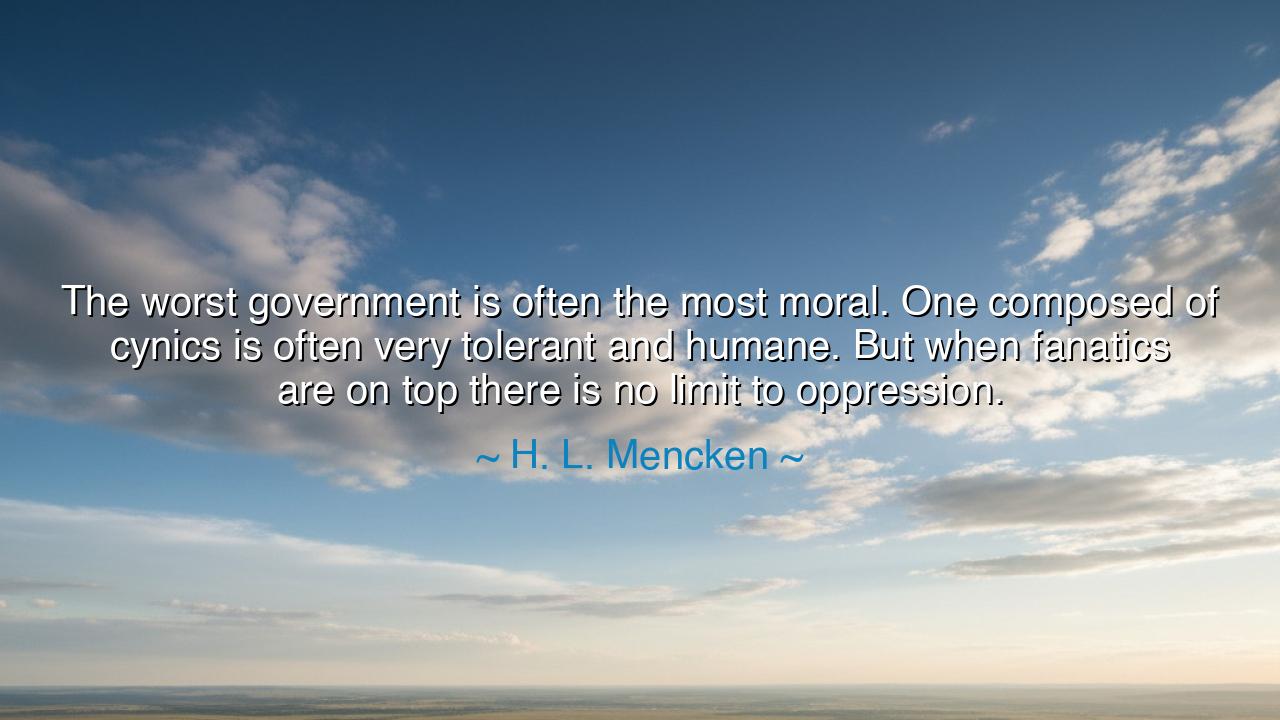
The worst government is often the most moral. One composed of
The worst government is often the most moral. One composed of cynics is often very tolerant and humane. But when fanatics are on top there is no limit to oppression.






The words of H. L. Mencken — “The worst government is often the most moral. One composed of cynics is often very tolerant and humane. But when fanatics are on top there is no limit to oppression.” — speak with the thunder of experience and the wisdom of ages. They unveil a truth both ancient and perilous: that fanatic virtue can be more dangerous than open vice, and that governments ruled by self-proclaimed saints may wound more deeply than those ruled by rogues. For power joined to moral certainty becomes a blade without restraint — striking not only at the guilty, but at all who dare to differ. The tyrant who steals for greed may sleep; but the tyrant who believes he is saving souls never rests.
Mencken, that sharp observer of human folly, knew that moral zeal untempered by humility turns virtue into violence. His words echo across history, where countless rulers have cloaked cruelty in righteousness. A cynic, hardened by doubt, may allow others to live as they will, knowing that no man is pure. But a zealot — convinced that his cause is sacred — sees no boundary to his mission. He will burn, banish, and break, believing each act a holy offering. Thus, Mencken warns us: beware the government that claims to rule for your moral good, for it may destroy your freedom in the name of your soul.
Consider the fate of the Spanish Inquisition. Its inquisitors claimed to guard the faith and purify the spirit of Christendom. Yet in their passion for holiness, they drowned the land in blood and fire. They silenced poets, burned thinkers, and tortured the innocent — not for gain, but for “virtue.” They believed that pain could save, that cruelty could cleanse. They were the perfect embodiment of Mencken’s warning: fanatics convinced of righteousness know no mercy, for they see opposition not as difference, but as sin. Thus, a government that seeks to perfect the human soul will often destroy the human body.
Yet Mencken’s insight is not mere cynicism. In truth, he honors the imperfect, the worldly, the skeptical — those who, knowing the weakness of human nature, govern with restraint. A government of cynics, he says, may be “tolerant and humane,” precisely because it knows no man can be remade by decree. It does not demand purity, only peace. Such rulers may be flawed, but their flaws are human; they understand the laughter and sorrow of ordinary life. They do not seek to control men’s hearts, only their crimes. In this, they are more merciful than the saints who would burn a city to save its souls.
History again proves his wisdom. When Oliver Cromwell rose in England, he proclaimed that he would bring godliness and order to a corrupt land. He banned laughter, music, and joy itself, declaring them sins against the Lord. He replaced tyranny with “virtue,” and the people found the new chains heavier than the old. It was not until his iron rule fell, and the laughter of the tavern returned, that England breathed again. So it is always: the moral despot is more cruel than the selfish one, for he tortures in the name of goodness, and believes every lash is blessed.
From this we learn a hard but holy truth — that freedom can only survive where humility rules the heart of power. No ruler, no system, no faith should ever presume infallibility. For once a leader believes his cause is the only good, he ceases to see others as human. The cynic may exploit; the fanatic will exterminate. And thus, in a strange twist of fate, the flawed often preserve what the “righteous” destroy.
Let the wise remember this: virtue without mercy is tyranny, and conviction without doubt is death. Guard against leaders who speak always of moral purity, for they will not stop until every thought is cleansed. Seek instead those who speak of balance, of tolerance, of the fragile dignity of human imperfection. For civilization is not built by angels, but by men who know their limits and temper their justice with understanding.
So, my child, if you would preserve freedom in your time, learn to distrust the cry of moral conquest. Be compassionate, but never coercive. Uphold truth, but never by force. Stand against evil, but beware of those who claim they alone define it. For it is better to live under the laughter of a cynic than the silence of a saint. And remember Mencken’s eternal lesson: it is not wickedness, but the illusion of perfect goodness, that breeds the darkest tyranny of all.






AAdministratorAdministrator
Welcome, honored guests. Please leave a comment, we will respond soon